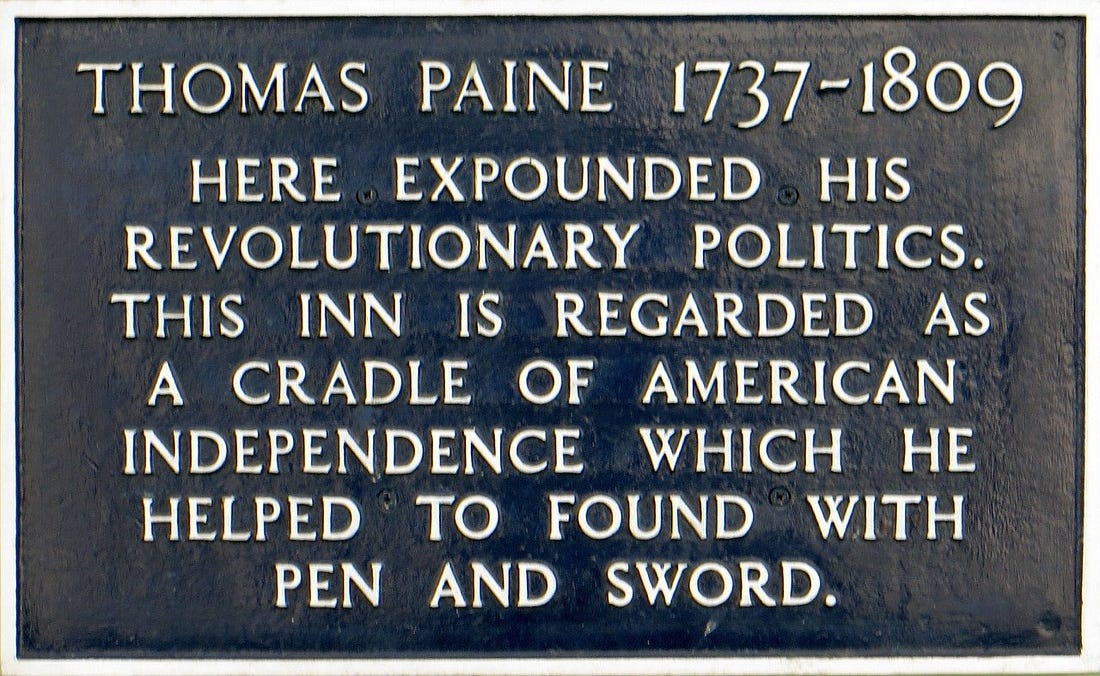“These are the times that try men’s souls.” As we celebrate Independence Day in the United States, I’m reminded that the American Revolution was a war that was fought not only with weapons, but with words. America’s Foremost ThinkerIt was early in America’s struggle that Thomas Paine, newly arrived from England, realized that the public needed a little guidance and clarity of thinking. And his writing began to do that in the essay “Reflections on Titles”:
Common Sense, Useful MatterThomas Paine was only in America for two years when he penned Common Sense (1776) at the encouragement of Benjamin Franklin and Benjamin Rush (even back then it was all about the Benjamins). The Enlightenment-inspired pamphlet showed reluctant Americans that they had a unique opportunity to change the course of history by creating a new sort of government in which people were free and had the power to rule themselves:
These Are the TimesBut it was The American Crisis (1776) that gave George Washington and his undernourished army the resolve to push on. Washington’s troops were on the verge of quitting when, on December 23, he had the pamphlets read to his men at Valley Forge, including that unforgettable opening line “these are the times that try men's souls.” Paine’s writing fortified their resolve when he reminded them:
Ignorance Is WeakBut even after Americans successfully defeated the British, established a government, and elected their first president, Paine felt it necessary to remind his fellow citizens that they ought to engage in critical thinking. In The Rights of Man (1791) he wrote:
No Lies ToldThree years later in The Age of Reason (1794), Paine observed the damaging nature of widespread lies, in a prescient reflection of our own post-truth era:
Love Your EnemyAs George Washington neared the end of his second term, Thomas Paine, then in France, recognized that the country was split. In 1795, he argued in A Dissertation on the First Principles of Government that there are rights that are due to every human, even our adversaries:
Principled ForceAnd in 1797, Paine published the pamphlet Agrarian Justice, making the case that communities should partially benefit from cultivated land, since the earth was the common property of the human race. He backed up his claim with moral authority, stating:
On this 4th of July, consider the powerful and timeless words of Thomas Paine, who reasoned with moral clarity and stirred the souls of Americans, simply through the power of the pen. May we all be so moved. There’s so much to learn, If you upgrade your subscription, you’ll have access to our full archives, plus additional content exclusive to our Ampersand Guild. Because you’re already a subscriber, please accept this discount in appreciation for believing in Timeless values:👔 Coaching | 🎙️Podcast | ⏱️ Stopwatch | ⏰Off The Clock | & Guild | 💡Timeless Reflections | 📚 Books |
No Paine, No Gain
Subscribe to:
Post Comments (Atom)
No Paine, No Gain
A collection of Thomas Paine quotes sets the tone for this Independence Day. ͏ ͏ ͏ ͏ ͏ ͏ ͏ ͏ ͏ ...
-
Excited to launch our first large format escape room for 4-10 players.͏ ͏ ͏ ͏ ͏ ͏ ͏ ͏ ͏ ͏ ͏ ͏ ͏ ͏ ͏ ͏ ͏ ͏ ͏ ͏ ͏ ͏ ͏ ͏...
-
What is your brand's strategy for expanding your loyal base, even in a landscape where consumers face economic pressures? ͏ ͏ ...




No comments:
Post a Comment